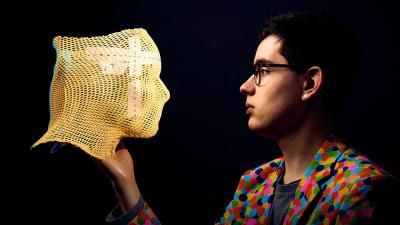That time of year: your cancerversary and your mental health
Kaleb from our Youth Advisory Group shares his blog post about how to manage your mental health when different times of the year bring back difficult memories after cancer, something lots of people like to call their ‘cancerversary’.
Anniversaries can be a date on our calendar, a note in our phone, a reminder from a friend, or a card in the post. They’re often celebratory occasions, perhaps a date of a wedding or a birthday, and we share joy in remembering the event.
Other anniversaries exist, though, which, although not necessarily marked in our calendars or phones, are remembered in our bodies. For me, the anniversary of my brain tumour diagnosis and some of my subsequent treatment holds this intrinsic place in my physical and emotional memory.
Why your cancerversary matters
Since my brain tumour diagnosis in 2015, I’ve become more familiar with the effects the anniversary of my diagnosis can have for me. Though the impacts of this anniversary vary year on year, I’ve found it hugely helpful to reflect on diagnosis anniversary experiences in order to recognise, acknowledge and process some of the continuing emotional effects of my diagnosis.
Our experiences of anniversaries can vary depending on all sorts of variables. Some of these might resonate with you, others may not. The most important thing to recognise is that your experience is valid, regardless of how others might experiences anniversaries significant to them.
The date of your cancerversary
Perhaps the most obvious aspect of an anniversary is the date! The day, week, month or more that’s associated with an anniversary can be a period of heightened tension and emotion. Recognising this and accepting these emotions as valid and reasonable can be a huge help in processing the often tumultuous feelings an anniversary can bring.
All sorts of events can be associated with an anniversary, too. It might be the date of a diagnosis, when symptoms became noticeable, the day of an operation, or anything else that holds emotional significance for you.
How you might feel on your cancerversary
Anniversaries can bring all sorts of emotions and physical responses. Equally, an anniversary might pass by completely unnoticed! For me, although I sometimes don’t realise until later, I frequently feel tense around the anniversary of my diagnosis; I also have disturbed sleep and memories from when I was diagnosed might pop into my head during the day.
These emotions can be difficult ones to feel, but recognising I’m experiencing them, naming them, and accepting them as valid has been immensely useful. Once I’ve done this, I feel more comfortable with the feelings I’m experiencing, which, ultimately, makes it easier to process them. As part of this emotional acknowledgement, I’ve found it really helpful to voice my feelings to some close family and friends – it’s an opportunity to articulate the upset, frustration, or loss I might be feeling about my diagnosis and, the act of speaking aloud to an understanding loved one can feel like a release of some of this emotion.
Acknowledging these emotions may change over time and with successive anniversaries can also be valuable; as years have gone on from my initial diagnosis and as I’ve had other treatment for my tumour, my experience of this anniversary have changed. This change isn’t necessarily a steady decrease in the potency of emotion surrounding the anniversary, it can be any change at all. Just recognising that my emotions may change and I might not be able to predict how has been really helpful.
Marking your cancerversary
Commemorating anniversaries can also be helpful. Openly acknowledging a date or period through a gathering or personal recognition can be a way of processing some of the emotions an anniversary brings. Equally, distraction can also be a great tactic! Whilst I’ll acknowledge the anniversary of my diagnosis by talking with my parents about the effects my tumour has had for us all, I’ll also distract myself through TV, films, or meeting with friends.
Getting support to process your diagnosis
Sometimes, though, it can also be beneficial to get some professional support. It’s important to note that getting support from a psychological specialist is not at all a sign that you’re not managing the emotional impact of a diagnosis well; instead, it’s an indication that you’ve reflected and recognised that getting this support is the best way to help yourself through a difficult experience.
I had sessions with an NHS psychologist about a year after I was diagnosed, which were brilliantly beneficial – they taught me more about myself, how I manage emotions, and strategies I could use to make the anniversary of my diagnosis easier. Speaking to your GP or oncologist about getting this support can be a great step.
Every cancerversary is different
Perhaps the most important thing I can say about anniversaries of a diagnosis is that they’re unique and personal experiences. This might seem obvious, but it’s still important to acknowledge. Your experiences might be similar to someone else’s, but they certainly don’t have to be.
We’re all unique individuals with unique life experiences, and it’s these things which affect how we uniquely experience an anniversary of a diagnosis.
As a result of this, the best way in which you manage a diagnosis anniversary is also unique. Finding what’s right for you is vital, and that might change over time. Acknowledging your feelings, noticing what they’re indicating is important for you, and being kind to yourself (around anniversaries in particular) is a great way to start.


